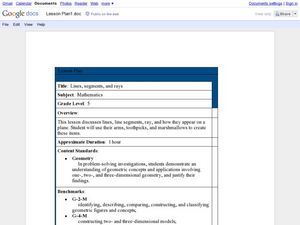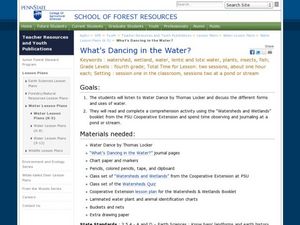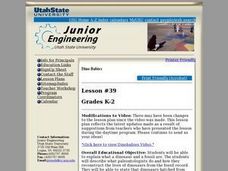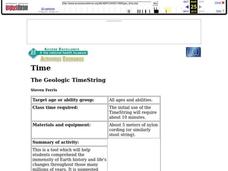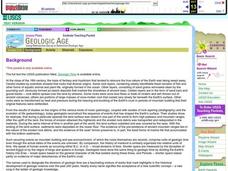American Museum of Natural History
Going, Going...Gone?
Young environmentalists consider how scientists are attempting to save endangered species. They read about what causes extinction and steps to take to minimize the threats.
American Museum of Natural History
Fascinating Fish
A fish is not just a fish. So many fish in remote places have unique characteristics. Take a trip with an ichthyologist to the Congo River to discover the species of one of the most diverse fish populations in the world. The online...
American Museum of Natural History
Saving Species
Some scientists dedicate their lives to researching and protecting endangered species. An online lesson teaches about three scientists around the world who do just that. They learn about spiders, mollusks, and reptiles from North...
American Museum of Natural History
Finding Fossils
How does one go about finding fossils? Find out with an informative webpage that looks at the digging process, showcases rocks and common fossils, helpful tips, and a list of archeological do's and don'ts.
Curated OER
Good Vibrations Remote Sensing data Collection: Thermal Emission Spectrometer
The Mars Global Surveyor spent two years creating a mineral map of the planet Mars using thermal emission spectrometry. To help young astronomers understand this remote sensing instrument, have them simulate how data is collected and...
Curated OER
Skin Cancer Investigation: A Multi-Component Project
Students compare the perceived and actual risks of getting skin cancer, while looking at ways to minimize these risks. They may have very little grasp of the severity of the threat of skin cancer or be unaware of the increase in the...
NASA
The Discovery of Jupiter Radio Waves
Lead your class on a journey to the planet Jupiter and provide them with fun facts in the process. Learners explore radio waves emitted by Jupiter to further understand how this data helps our daily lives. They conclude by discussing...
K12 Reader
Broken Promises
This comprehension worksheet asks readers to respond to a series of questions based on an article about the treatment of native peoples.
Brak Software, Inc.
Human Japanese Lite HD
Start with the basics of the Japanese language. The app, which is organized into chapters similar to a textbook, is made up of approachable text, which reads like someone calmly talking you through the aspects of the Japanese language,...
Howard Hughes Medical Institute
Winogradsky Columns: Microbial Ecology in the Classroom
Winogradsky columns are ideal for observing the role of bacteria and other microorganisms in an ecosystem. This student activity guide is complete with data tables for observations and analysis questions for processing what was observed....
PHET
Science and Engineering Conference
Young scientists present their experimental designs from the previous experiment. The ninth lesson in the series outlines what learners should present, what class discussions should happen, and the solution NASA came up with for the same...
PHET
Iron Filings and Magnetic Field Lines
How do magnetic fields differ? Allow scholars to see the difference between 2-D and 3-D magnetic fields. They construct models of both and observe how they are similar and different. It is the fifth installment of an 18-part unit.
Workforce Solutions
A Colony for Lunar Living
Two lessons explore the possibility of living on the moon. First, scholars read various scenarios to identify which careers would best transfer to life in space. Finally, pupils examine a website to locate items made for outer space,...
Curated OER
Modeling Geologic Time
Learners design, construct and interpret a model of geologic time and investigate change through geologic time.
Curated OER
Investigation 6 - Dinosaur Extinction
Fourth graders research and analyze theories on why dinosaurs became extinct. They need to find clues as to what the cause may have been. They record the evidence that they find to support their theory on the Dinosaur Extinction Theory...
Curated OER
Lines, Segments, and Rays
Fifth graders use their arm, toothpicks, and marshmallows to create lines, segments, and rays. In this lines, segments, and rays lesson plan, 5th graders learn how these appear on a plane.
Curated OER
Rocks, Minerals, and Fossils
Fourth graders do 5 different lab stations to explore rocks, minerals, and fossils.
Curated OER
Living in a Watershed
Fourth graders examine watersheds. In this ecosystem lesson, 4th graders discover what a watershed is and identify the local watershed they live in. Students investigate the attributes of a watershed as well.
Curated OER
What's Dancing in the Water?
Students learn about watershed, as well as the different forms and uses of water. In this water forms activity, students brainstorm water sources and uses. Students read the book Water Dance and discuss water examples. Students complete...
Curated OER
Dino Babies
Students distinguish between dinosaurs and fossils. They escribe what paleontologists do and how they reconstruct the lives of dinosaurs from the fossil record. In addition, they state that dinosaurs hatched from eggs.
Curated OER
My Time
Students create a timeline of their lives. In this timeline lesson, students discuss relative and absolute time. They use events in their lives to create categories on a timeline. They link this lesson to geologic timelines.
Curated OER
The Geologic TimeString
Learners create a simple tool to visualize geologic time. They create knots to represent the K/T, P/T and Precambrian boundaries in a 4.6 meter string with each millimeter representing one million years. They then refer back to this...
Curated OER
What Is Engineering Design
Students investigate the concepts related to the practice of designing and building large scale buildings. They conduct research using the internet and other resources in order to apply mathematics and architectural design principals in...
Curated OER
Geologic Age
Students investigate radioactivity as a tool for measuring geologic time and how geologists use this information to determine the absolute age of rocks or minerals.
Other popular searches
- Earth's History Time Line
- Soil and Earth's History
- Powerpoint Earth's History
- Earth's History Timeline















